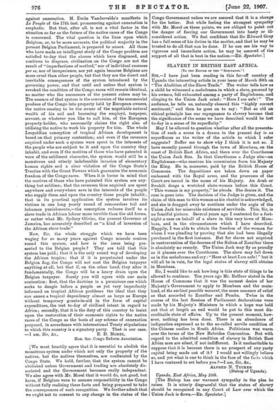BELGIUM AND THE CONGO.
[To vs. Eorros or yes “SrsarArOs.".1 Henri Lavalette is in error when be 'aye (Spectator, June 15th) that all political parties in Belgium are in favour of taking over the Congo. An extraordinary session of the Laixier. Party will he held shortly in pruscuic, cud it will decide
against annexation. M. 2mile Vandervelde's manifesto in Is Peuple of the 17th inst. pronouncing against annexation is emphatic. But that, after all, is not a vital factor in the situation so far as the future of the native races of the Congo is concerned. The vital question is the lines upon which Belgium, or, to be more accurate, the political majority in the present Belgian Parliament, is prepared to annex. All those who have made an intelligent study of the Congo problem are satisfied to-day that the abuses which have disgraced, and continue to disgrace, civilisation on the Congo are not the result of "imperfections of method," nor of individual excesses per se, nor of inexperience, nor yet again because Belgians are more cruel than other people, but that they are the direct and inevitable consequences of the system introduced by the governing power, and that until and unless that system is revoked the condition of the Congo races will remain identical, no matter who the successors of the present rulers may be. The essence of that system is the conversion of the commercial produce of the Congo into property held by European owners, the native ceasing to be the owner of the negotiable natural wealth of his soil and becoming the employe, taxpayer, servant, or whatever you like to call him, of the European property-holder, who necessarily claims the right also of utilising the native to work his property for him. The whole Leopoldian conception of tropical African development is based on that primary contention; and even if the revenues acquired under such a system were spent in the interests of the people who are subject to it and upon the country they inhabit, and even if the motives of those who have patented it were of the sublimest character, the system would still be a monstrous and utterly indefensible invasion of elementary human rights and a clear violation of the Congo State's Treaties with the Great Powers which guarantee the economic freedom of the Congo races. When it is borne in mind that the motives of those who have patented this system are any- thing but sublime; that the revenues thus acquired are spent anywhere and everywhere save in the interests of the people who supply them and upon the country those people inhabit ; that in its practical application the system involves its victims in one long yearly round of remorseless toil and inhuman punishments,—the conception reduces itself to a slave trade in African labour more terrible than the old forms, or rather what Mr. Sydney Olivier, the present Governor of Jamaica, has accurately described as "a kind of inversion of the African slave trade."
Now, Sir, the whole struggle which we have been waging for so many years against Congo misrule centres round this system, and how is the issue being pre- sented to the Belgian people ? They are told that this system has paid; that it is the only sound way of developing the African tropics; that if it is perpetuated under the Belgian flag, the Congo will not cost the Belgian taxpayer anything at all, but that if, on the other hand, they alter it fundamentally, the Congo will be a heavy drain upon the Belgian taxpayer. Surely you will agree with our main contention : first, that the doctrine is a pernicious one which seeks to dangle before a people as yet very imperfectly informed on tropical African problems the ideal that they can annex a tropical dependency almost as large as Europe without temporary grants-in-aid in the form of capital expenditure, the test to-day of civilised intent in regard to Africa; secondly, that it is the duty of this country to insist upon the restoration of their economic rights to the native races of the Congo as the basis of any scheme of annexation proposed, in accordance with international Treaty stipulations to which this country is a signatory party. That is our case.
—I am, Sir, &c., E. D. MOREL,
Hon. Sec. Congo Reform Association.
[We most heartily agree that it is essential to abolish the monstrous system under which not only the property of the natives, but the natives themselves, are confiscated by the Congo State. We hold, further, that the system cannot be abolished unless Government and trading are absolutely dis- sociated and the Government becomes really independent. We also agree with Mr. Morel that it would do, not good, but harm, if Belgium were to assume responsibility in the Congo without fully realising these facts and being prepared to take the consequences of such recognition. We further admit that we ought not to consent to any change in the status of the Congo Government unless we are assured that it is a change for the better. But while feeling the strongest sympathy' with Mr. Morel on these points, we are obliged to point out the danger of forcing our Government into hasty or considered action. We feel confident that Sir Edward Grey has a full sense of his duties in the matter, and that he may be trusted to do all that can be done. If he can see his way to vigorous and immediate action, he may be assured of the support of all that is best in the nation.—ED. Spectator.]











































 Previous page
Previous page